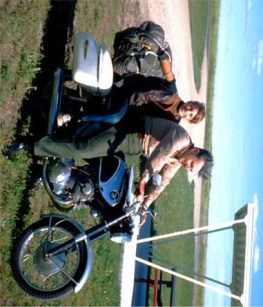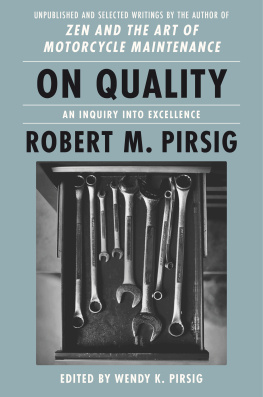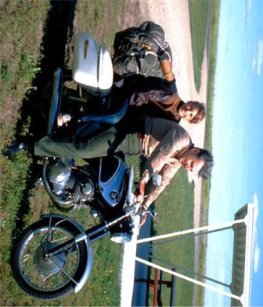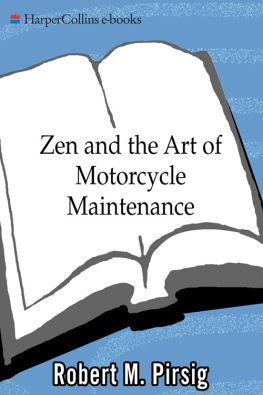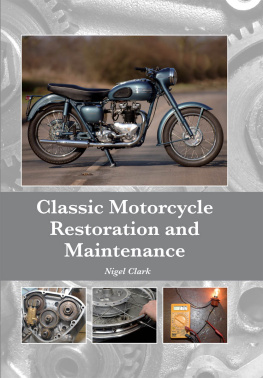Robert M. Pirsig
Zen and the Art of Motorcycle Maintenance
AN INQUIRY INTO VALUES
Author's Note
What follows is based on actual occurrences. Although much has been changed for rhetorical purposes, it must be regarded in its essence as fact. However, it should in no way be associated with that great body of factual information relating to orthodox Zen Buddhist practice. It's not very factual on motorcycles, either.
And what is good, Ph?drus,
And what is not good
Need we ask anyone to tell us these things?
Part I
1
I can see by my watch, without taking my hand from the left grip of the cycle, that it is eight-thirty in the morning. The wind, even at sixty miles an hour, is warm and humid. When it's this hot and muggy at eight-thirty, I'm wondering what it's going to be like in the afternoon.
In the wind are pungent odors from the marshes by the road. We are in an area of the Central Plains filled with thousands of duck hunting sloughs, heading northwest from Minneapolis toward the Dakotas. This highway is an old concrete two-laner that hasn't had much traffic since a four-laner went in parallel to it several years ago. When we pass a marsh the air suddenly becomes cooler. Then, when we are past, it suddenly warms up again.
I'm happy to be riding back into this country. It is a kind of nowhere, famous for nothing at all and has an appeal because of just that. Tensions disappear along old roads like this. We bump along the beat-up concrete between the cattails and stretches of meadow and then more cattails and marsh grass. Here and there is a stretch of open water and if you look closely you can see wild ducks at the edge of the cattails. And turtles. -- There's a red-winged blackbird.
I whack Chris's knee and point to it.
"What!'' he hollers.
"Blackbird!''
He says something I don't hear."What?'' I holler back.
He grabs the back of my helmet and hollers up, "I've seen lots of those, Dad!''
"Oh!'' I holler back. Then I nod. At age eleven you don't get very impressed with red-winged blackbirds.
You have to get older for that. For me this is all mixed with memories that he doesn't have. Cold mornings long ago when the marsh grass had turned brown and cattails were waving in the northwest wind. The pungent smell then was from muck stirred up by hip boots while we were getting in position for the sun to come up and the duck season to open. Or winters when the sloughs were frozen over and dead and I could walk across the ice and snow between the dead cattails and see nothing but grey skies and dead things and cold. The blackbirds were gone then. But now in July they're back and everything is at its alivest and every foot of these sloughs is humming and cricking and buzzing and chirping, a whole community of millions of living things living out their lives in a kind of benign continuum.
You see things vacationing on a motorcycle in a way that is completely different from any other. In a car you're always in a compartment, and because you're used to it you don't realize that through that car window everything you see is just more TV. You're a passive observer and it is all moving by you boringly in a frame.
On a cycle the frame is gone. You're completely in contact with it all. You're in the scene, not just watching it anymore, and the sense of presence is overwhelming. That concrete whizzing by five inches below your foot is the real thing, the same stuff you walk on, it's right there, so blurred you can't focus on it, yet you can put your foot down and touch it anytime, and the whole thing, the whole experience, is never removed from immediate consciousness.
Chris and I are traveling to Montana with some friends riding up ahead, and maybe headed farther than that. Plans are deliberately indefinite, more to travel than to arrive anywhere. We are just vacationing. Secondary roads are preferred. Paved county roads are the best, state highways are next. Freeways are the worst. We want to make good time, but for us now this is measured with emphasis on "good'' rather than "time'' and when you make that shift in emphasis the whole approach changes. Twisting hilly roads are long in terms of seconds but are much more enjoyable on a cycle where you bank into turns and don't get swung from side to side in any compartment. Roads with little traffic are more enjoyable, as well as safer. Roads free of drive-ins and billboards are better, roads where groves and meadows and orchards and lawns come almost to the shoulder, where kids wave to you when you ride by, where people look from their porches to see who it is, where when you stop to ask directions or information the answer tends to be longer than you want rather than short, where people ask where you're from and how long you've been riding.
It was some years ago that my wife and I and our friends first began to catch on to these roads. We took them once in a while for variety or for a shortcut to another main highway, and each time the scenery was grand and we left the road with a feeling of relaxation and enjoyment. We did this time after time before realizing what should have been obvious: these roads are truly different from the main ones. The whole pace of life and personality of the people who live along them are different. They're not going anywhere. They're not too busy to be courteous. The hereness and nowness of things is something they know all about. It's the others, the ones who moved to the cities years ago and their lost offspring, who have all but forgotten it. The discovery was a real find.
I've wondered why it took us so long to catch on. We saw it and yet we didn't see it. Or rather we were trained not to see it. Conned, perhaps, into thinking that the real action was metropolitan and all this was just boring hinterland. It was a puzzling thing. The truth knocks on the door and you say, "Go away, I'm looking for the truth,'' and so it goes away. Puzzling.
But once we caught on, of course, nothing could keep us off these roads, weekends, evenings, vacations. We have become real secondary-road motorcycle buffs and found there are things you learn as you go.
We have learned how to spot the good ones on a map, for example. If the line wiggles, that's good. That means hills. If it appears to be the main route from a town to a city, that's bad. The best ones always connect nowhere with nowhere and have an alternate that gets you there quicker. If you are going northeast from a large town you never go straight out of town for any long distance. You go out and then start jogging north, then east, then north again, and soon you are on a secondary route that only the local people use.
The main skill is to keep from getting lost. Since the roads are used only by local people who know them by sight nobody complains if the junctions aren't posted. And often they aren't. When they are it's usually a small sign hiding unobtrusively in the weeds and that's all. County-road-sign makers seldom tell you twice. If you miss that sign in the weeds that's your problem, not theirs. Moreover, you discover that the highway maps are often inaccurate about county roads. And from time to time you find your "county road'' takes you onto a two-rutter and then a single rutter and then into a pasture and stops, or else it takes you into some farmer's backyard.
So we navigate mostly by dead reckoning, and deduction from what clues we find. I keep a compass in one pocket for overcast days when the sun doesn't show directions and have the map mounted in a special carrier on top of the gas tank where I can keep track of miles from the last junction and know what to look for. With those tools and a lack of pressure to "get somewhere'' it works out fine and we just about have America all to ourselves.

